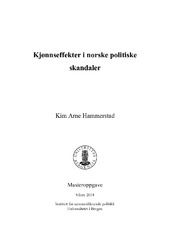Kjønnseffekter i norske politiske skandaler
Master thesis
Permanent lenke
https://hdl.handle.net/1956/18610Utgivelsesdato
2018-06-13Metadata
Vis full innførselSamlinger
Sammendrag
There have never been more women in Norwegian politics, and never has there been as many political scandals. Does gender have an impact on what type of scandals a politician gets involved in or the type of strategy the politician choses when handling a scandal? Do voters judge a female politician more harshly than a male one, when both have been involved in an entirely identical scandal? These are the types of questions this thesis seeks to answer. The thesis is based on theory that states that the media are the main driving force behind modern political scandals. Therefore, I use media reports as a measure of the scandal’s size and scope. I have analysed 66,000 media reports that deal with 41 scandals in Norwegian politics since 1945 to categorize the scandals on a variety of variables. Then I conduct a quantitative analysis of the variables. To illustrate the voter’s perspective on the scandals, I conducted a survey experiment with data from the Norwegian Citizens' Panel with 1484 respondents. The main finding of the analysis is that gender has an impact both before, during and after a scandal. Gender helps to influence what kind of scandal the politicians end up in, as well as what strategy the politicians choose to deal with the scandal. While male politicians choose to apologize their transgressions more, female politicians to a greater degree choose "hard" strategies like retraction and justification. This leads to longer scandals when a female politician is scandalized, compared to a scandal with a male politician. Female politicians involved in a scandal also experience a much more intensive media coverage during the scandal than male politicians. Furthermore, I find that no female politicians have made a political comeback after a scandal in Norwegian politics. With regard to the perspective of the voters, the differences are smaller, but we see that voters judge a scandalized politician of the opposite sex stricter than a politician of the same sex. This shows that voters evaluate scandalized politicians from opposite sex harsher than politicians of same sex.
